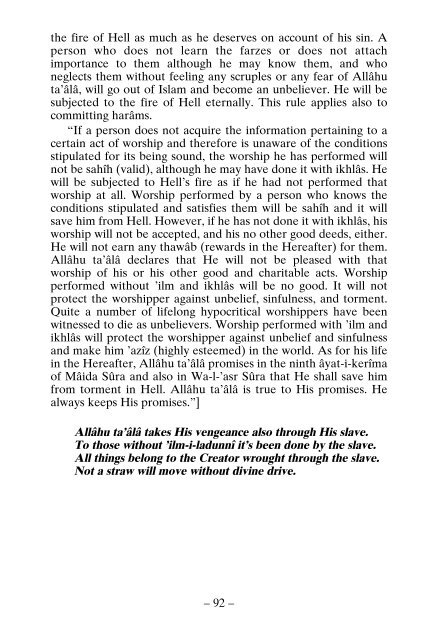Belief and Islam
BELIEF AND ISLAM star This work, Belief and Islam, originally was written in Persian under the title I’tiqâd-nâma by Hadrât Mawlânâ Khâlid al-Baghdâdî, a profound ‘âlim of Islam and a specialist in ma’ârif of tasawwuf. Hâji Faydullah Effendi of Kemah, a khalîfa of great walî Mavlânâ Mahmûd Sâhib, the brother of the author, translated the book into Turkish and named it Farâid-ul-fawâid which was printed in Istanbul in 1312 A.H.[1894]. Our bookstore had it translated again from the Persian original into Turkish and, some explanations and three chapters, published it with the title Imân ve Islâm in 1966. German, French and Arabic versions are also published by our bookstore. This book, explains five fundamentals of Islam, six fundamentals of îmân and the contemporary information about the matter and refutes those who are against Islam and those who are lâ-madbhabî.
BELIEF AND ISLAM
star This work, Belief and Islam, originally was written in Persian under the title I’tiqâd-nâma by Hadrât Mawlânâ Khâlid al-Baghdâdî, a profound ‘âlim of Islam and a specialist in ma’ârif of tasawwuf. Hâji Faydullah Effendi of Kemah, a khalîfa of great walî Mavlânâ Mahmûd Sâhib, the brother of the author, translated the book into Turkish and named it Farâid-ul-fawâid which was printed in Istanbul in 1312 A.H.[1894]. Our bookstore had it translated again from the Persian original into Turkish and, some explanations and three chapters, published it with the title Imân ve Islâm in 1966. German, French and Arabic versions are also published by our bookstore. This book, explains five fundamentals of Islam, six fundamentals of îmân and the contemporary information about the matter and refutes those who are against Islam and those who are lâ-madbhabî.
You also want an ePaper? Increase the reach of your titles
YUMPU automatically turns print PDFs into web optimized ePapers that Google loves.
the fire of Hell as much as he deserves on account of his sin. A<br />
person who does not learn the farzes or does not attach<br />
importance to them although he may know them, <strong>and</strong> who<br />
neglects them without feeling any scruples or any fear of Allâhu<br />
ta’âlâ, will go out of <strong>Islam</strong> <strong>and</strong> become an unbeliever. He will be<br />
subjected to the fire of Hell eternally. This rule applies also to<br />
committing harâms.<br />
“If a person does not acquire the information pertaining to a<br />
certain act of worship <strong>and</strong> therefore is unaware of the conditions<br />
stipulated for its being sound, the worship he has performed will<br />
not be sahîh (valid), although he may have done it with ikhlâs. He<br />
will be subjected to Hell’s fire as if he had not performed that<br />
worship at all. Worship performed by a person who knows the<br />
conditions stipulated <strong>and</strong> satisfies them will be sahîh <strong>and</strong> it will<br />
save him from Hell. However, if he has not done it with ikhlâs, his<br />
worship will not be accepted, <strong>and</strong> his no other good deeds, either.<br />
He will not earn any thawâb (rewards in the Hereafter) for them.<br />
Allâhu ta’âlâ declares that He will not be pleased with that<br />
worship of his or his other good <strong>and</strong> charitable acts. Worship<br />
performed without ’ilm <strong>and</strong> ikhlâs will be no good. It will not<br />
protect the worshipper against unbelief, sinfulness, <strong>and</strong> torment.<br />
Quite a number of lifelong hypocritical worshippers have been<br />
witnessed to die as unbelievers. Worship performed with ’ilm <strong>and</strong><br />
ikhlâs will protect the worshipper against unbelief <strong>and</strong> sinfulness<br />
<strong>and</strong> make him ’azîz (highly esteemed) in the world. As for his life<br />
in the Hereafter, Allâhu ta’âlâ promises in the ninth âyat-i-kerîma<br />
of Mâida Sûra <strong>and</strong> also in Wa-l-’asr Sûra that He shall save him<br />
from torment in Hell. Allâhu ta’âlâ is true to His promises. He<br />
always keeps His promises.”]<br />
Allâhu ta’âlâ takes His vengeance also through His slave.<br />
To those without ’ilm-i-ladunnî it’s been done by the slave.<br />
All things belong to the Creator wrought through the slave.<br />
Not a straw will move without divine drive.<br />
– 92 –

















